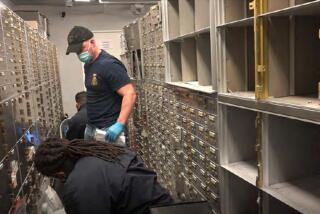Judge Dismisses Counts Against 12 in Bank Case : Says Claims Failed to Specify Fraud in Heritage Litigation
- Share via
After 20 months of litigation and millions of dollars in attorney fees, an Orange County judge has thrown out civil fraud claims against nearly a third of 35 former Heritage Bank officers, directors and others being sued by the federal government.
While the Oct. 17 ruling applies to only 12 of the 35 defendants, Superior Court Judge Robert C. Todd said from the bench Friday that he will modify his decision, indicating that it could apply to all defendants, including Douglas E. Patty, the deposed chairman and chief executive of the failed bank.
The Federal Deposit Insurance Corp. declared the bank insolvent and closed it in March, 1984.
Attorneys for several of the defendants hailed the decision as “a significant victory” and a turning point in the $150-million lawsuit brought by the FDIC as receiver for Heritage.
But Todd upheld “the guts of the case”--primarily allegations of negligence, breach of fiduciary duties and punitive damages--and only attacked “the fringes” of the FDIC’s allegations, said Henry H. Rossbacher of Los Angeles, a lawyer with the FDIC’s outside law firm handling the case--Finley, Kumble, Wagner, Heine, Underberg, Manley & Casey.
Nevertheless, the FDIC must file a new pleading, its fourth amended complaint since it first filed the suit in March, 1985. The last amended complaint was 1,029 pages long.
With tinges of exasperation, Todd warned the FDIC in his ruling that its claims of fraudulent activities by some of the defendants would be thrown out permanently if the new complaint fails again to allege specifically the fraud that occurred.
The judge permanently dismissed all claims against the defunct Knecht & Donahue, the Newport Beach law firm that represented Heritage and its directors and officers. He said the FDIC failed to name the firm within the one-year statute of limitations.
In addition, Todd said, the law firm’s actions “theoretically” were no different than the actions of Los Angeles lawyer Jeffrey Tisdale, who was advising defendant Orange Coast Savings & Loan Assn. even after he was hired by Finley Kumble.
The hiring of Tisdale, who was not named in the suit, led to Finley Kumble’s disqualification because it created a conflict of interest. While Todd’s ruling on that matter is on appeal, the firm is continuing to represent the FDIC. Finley Kumble has picked up $1.5 million or more in legal fees since the suit was filed and stands to earn more than $2 million more over the next few years.
Joseph R. Donahue, who said the FDIC suit caused his law partnership to break up, called the ruling a major turning point in the case as well as vindication for him and his former partner.
“The FDIC spends $1.5 million in attorney fees and doesn’t have a complaint on file,” he said. “I’m glad I’m not involved anymore, but somehow I wish I was still representing some of the defendants.”
Donahue contends that his firm was initially sued only because the FDIC wanted to stop it from representing Heritage in the receivership action. Ethics rules prohibit lawyers from representing clients when they are named as defendants in same action.
Barry R. Laubscher, an attorney for Orange Coast Title Co., which challenged the complaint, also viewed the decision as “a major development . . . a significant victory.”
Orange Coast Title’s owner, John Marconi, was a director on the Heritage board, but Todd ruled that any fraud or negligence alleged against Marconi could not be also attributed to his company under the legal theory that the FDIC was using.
Rossbacher said the FDIC would appeal that issue and other portions of the decision if Todd’s revised ruling does not change the judge’s view that outside companies run by Heritage directors cannot be charged with the alleged misdeeds of their owners.
One of the “fringes” Todd ruled on was the FDIC’s request to set up a trust to control certain of the defendants’ assets and to use them for the benefit of the bank.
He dismissed the request permanently because the FDIC has failed in all of its complaints to identify the property to be put in trust. The lawsuit, Todd said, is one for monetary damages, not for establishment of a trust.
Heritage once was Orange County’s biggest bank, with more than $280 million in assets and nine branches.
More to Read
Sign up for Essential California
The most important California stories and recommendations in your inbox every morning.
You may occasionally receive promotional content from the Los Angeles Times.










